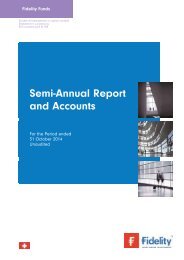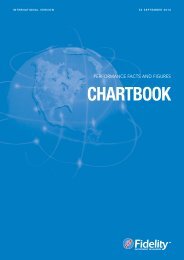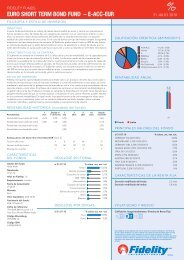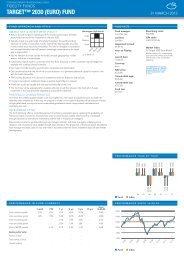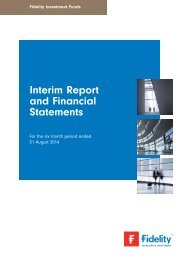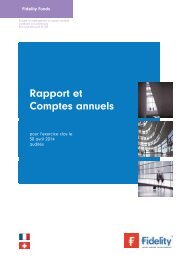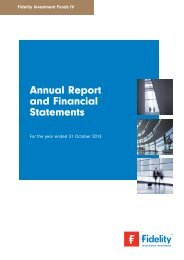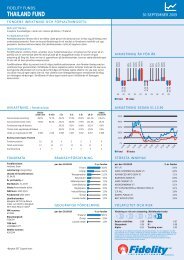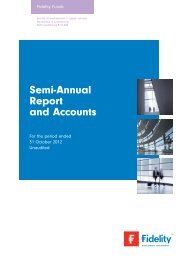Semi-Annual Reports and Accounts - Fidelity Worldwide Investment
Semi-Annual Reports and Accounts - Fidelity Worldwide Investment
Semi-Annual Reports and Accounts - Fidelity Worldwide Investment
Create successful ePaper yourself
Turn your PDF publications into a flip-book with our unique Google optimized e-Paper software.
FIDELITY MULTI ASSET BALANCED INCOME FUNDINVESTMENT OBJECTIVE AND POLICYThe fund’s investment objective is to achieve a balance of income <strong>and</strong> longterm capital growth. The Fund will invest primarily in collective investmentschemes including those managed by <strong>Fidelity</strong>. The Fund will gain exposure toa range of global assets through allocation to bonds <strong>and</strong> to company shares.The Fund may also gain exposure to commodities, property <strong>and</strong> cash <strong>and</strong>invest directly in equities, bonds, money market instruments, cash <strong>and</strong> deposits.Derivatives <strong>and</strong> forward transactions may also be used for investmentpurposes.FUND MANAGER’S COMMENTARYMARKET REVIEWThe general level of interest rates <strong>and</strong> yields remained low over the period.Improving economic data in developed countries supported equity markets.However worries about the impact of the reduction in money supply by the USFederal Reserve (Fed), concerns about slower growth in China <strong>and</strong>geopolitical tensions in Ukraine limited gains. Within fixed income assets, highyield <strong>and</strong> corporate bonds gained the most, benefiting from investors’ searchfor returns. Property shares underperformed other asset classes following theFed’s announcement that it could begin tapering money supply. This couldlead to a rise in interest rates, which would likely impact property shares asthey are sensitive to changes in interest rates.PORTFOLIO ACTIVITYThe selection of underlying funds in the fixed income segment was notablyrewarding. Funds invested in investment grade <strong>and</strong> high yield bonds benefitedfrom the strong performance of these asset classes. Consequently, holdings in<strong>Fidelity</strong> Extra Income Fund, <strong>Fidelity</strong> Institutional UK Corporate Bond Fund <strong>and</strong><strong>Fidelity</strong> Funds – European High Yield Fund supported returns. Elsewhere, theallocation to loans (a type of high yield security that offer returns that rise inline with an increase in interest rates <strong>and</strong> provide greater protection to bondholders in the event of a default) boosted performance. Notably, a newholding in TwentyFour Income Fund aided performance. Within theinfrastructure sector, a new position in Doric Nimrod Air Two, an aircraftleasing company, supported returns. Since the fund focuses on incomegeneration, we mainly hold dividend paying stocks in the equity segment.These tend to outperform the broader market when there are concerns aboutgrowth. Consequently, the equity segment supported returns. Over the reviewperiod, we reduced our position in equities via <strong>Fidelity</strong> Global Dividend Fundin view of emerging risks to global growth. Within the investment grade bondssegment, we lowered the exposure to <strong>Fidelity</strong> MoneyBuilder Income Fund <strong>and</strong><strong>Fidelity</strong> Extra Income Fund. Meanwhile, we raised the allocation to <strong>Fidelity</strong>Institutional UK Aggregate Bond Fund as it is relatively more sensitive tochanges in interest rates. This holding is therefore likely to benefit fromcontinued low interest rates if growth slips. Elsewhere, the sharp fall inemerging market debt in January made returns from this asset class attractive.Consequently, we bought a holding in <strong>Fidelity</strong> Funds - Emerging Market DebtFund. We also purchased a new position in Tritax Big Box REIT, which investsin large warehouse <strong>and</strong> distribution facilities in the UK. It is expected to offerrobust <strong>and</strong> increasing returns that are likely to outpace inflation.OUTLOOKWe believe the global economy is in the recovery phase of the economiccycle, which is characterised by improving growth <strong>and</strong> low inflation. However,slowing growth in China <strong>and</strong> geopolitical tension in Ukraine make us cautiousabout the growth outlook. The focus on income generation is primarilyachieved through fixed income holdings. At the same time, there areopportunities in infrastructure, loans <strong>and</strong> property that can offer attractive,growing dividends as well as some potential for capital growth.PERFORMANCE RECORDA discrete 1 year performance table has not been included as the fundlaunched on 4 September 2013 <strong>and</strong> does not have a full twelve monthperformance record.RISK PROFILEIf you make regular withdrawals from your investment, this may reduce yourcapital over time if the fund’s growth does not compensate for the withdrawals.Some funds will invest in ‘sub-investment grade’ bonds. These bonds mayproduce a higher level of income than ‘investment grade’ bonds but at a higherrisk to your capital. With funds that invest in bonds, cash or other money marketinstruments there is a risk that the issuer may default. The likelihood of thishappening will depend on the credit-worthiness of the issuer. The risk of defaultis usually greatest with bonds that are classed as sub-investment grade. Somefunds take their annual management charge from your capital <strong>and</strong> not from theincome generated by the fund. This means that any capital growth in the fundwill be reduced by the charge. And, your capital may reduce over time if thefund’s growth does not compensate for it. Some funds are able to invest someor all of their assets in developing overseas markets which carry a higher riskthan investing in larger established markets. <strong>Investment</strong>s in emerging marketsare likely to experience greater rises <strong>and</strong> falls in value <strong>and</strong> there may betrading difficulties. Some funds invest in overseas markets. This means thatchanges in currency exchange rates will affect the value of your investment. Forsome funds, derivatives <strong>and</strong> forward transactions may be used for specificinvestment purposes, as well as for hedging <strong>and</strong> other efficient managementpurposes as permitted for all funds. Where this is the case, their use may leadto higher volatility in the fund’s share price. For funds that use derivativetransactions, there is a risk that the counterparty to the transaction will whollyor partially fail to honour its contractual obligations. This may result in financialloss to the fund. We assess the creditworthiness of counterparties as part of ourrisk management process. The value of the fund may be affected if any of theinstitutions with which cash is deposited suffers insolvency or other financialdifficulty. Each of our funds is operated as a separate entity with its own assets<strong>and</strong> liabilities. However, if the liabilities of one fund were to exceed its assets,the other funds within the scheme might have to transfer across money to coverthe liabilities. This means that the fund you invest in may be worth less if it hasto transfer money to another fund.Eugene Philalithis & Nick PetersFund Managers30 April 1424



